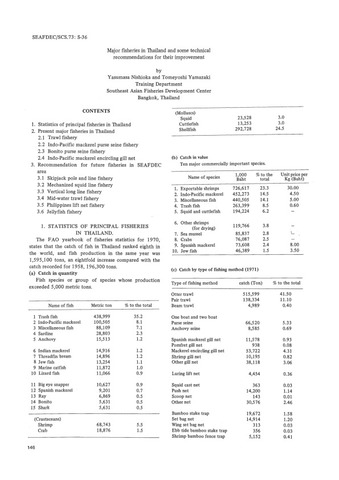Guidelines on Eco‐labeling for the Canned Tuna Industry
Share
Description
This guideline on Eco-Labeling for the Canned Tuna Industry have been developed through the initiative of SEAFDEC/TD, to serve as guide for interested ASEAN member countries in developing the more specific code for their products/country interests. Along this vein, the Chain of Custody Certification or Processing and Distribution Certification is also elaborated in this document for reference by interested ASEAN member countries. Nonetheless, SEAFDEC envisaged that these two initiatives can be beneficial to the ASEAN and SEAFDEC member countries as well as to other interested countries, for the further development of their respective fisheries and aquaculture industries.
การอ้างอิง
SEAFDEC. (2009). Guidelines on eco‐labeling for the canned tuna industry. Samut Prakarn: Training Department, Southeast Asian Fisheries Development Center.
เรื่อง
คอลเลกชัน
- SEAFDEC/TD [12]
รายการที่เกี่ยวข้อง
แสดงรายการที่เกี่ยวข้องตามชื่อผู้แต่งผู้สร้างและเรื่อง
-
The Status of Fisheries in the Republic of Maldives
Faiz, Mohamed (Training Department, Southeast Asian Fisheries Development Center, 1997)The paper discusses the tuna fisheries in Maldives which dominates its fishing industry. Apart from a very strong domestic market, tuna is also the main export commodity of the country. Moreover, reef fisheries such as, ... -
Major fisheries in Thailand and some technical recommendations for their improvement
Nishioka, Yasumasa; Yamazaki, Tomeyoshi (Japan International Cooperation Agency, 1977)Presented in this paper is the development of fisheries industry in Thailand. The data on the production of the principal fisheries species and major fishing methods are also presented. Also included are the recommendations ... -
Status of Fishing Conditions in Cambodia
Sour, Kim; Vuthy, Ros (Training Department, Southeast Asian Fisheries Development Center, 1997)Fisheries in plays a very important role in Cambodia’s national economic development. Total fish catch production in 1996 was 104 310 tones, about which 60% was contributed by inland capture fisheries, 30% by marine capture ...





